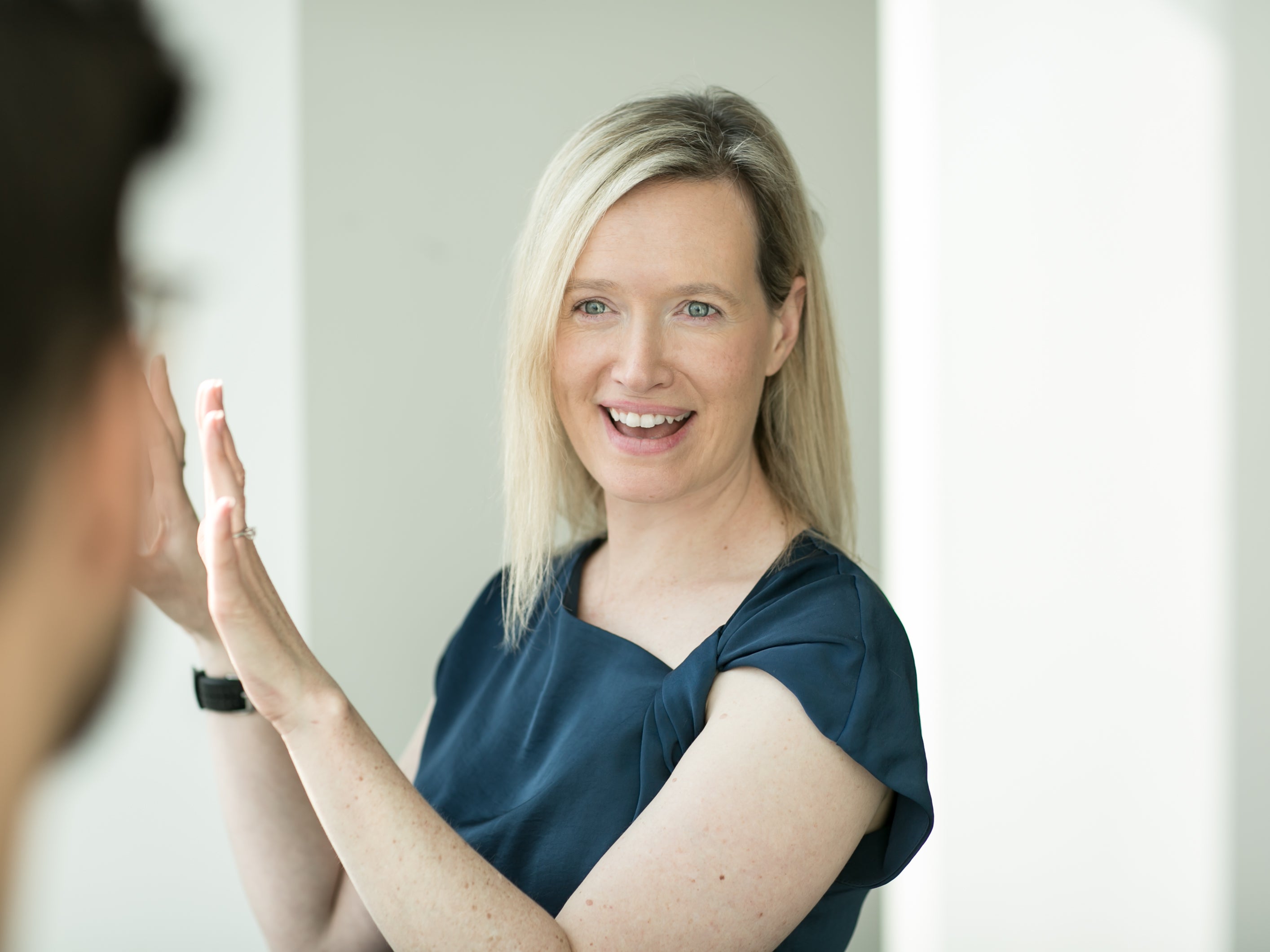How an intimacy coordinator start-up is making sex scenes safe for actors
Vanessa Coffey maps out intimate moments on set for stars like Billie Piper – and now businesses want her to set boundaries in the workplace too, she tells Andy Martin


In the boardroom or bedroom, does anyone really know what they are doing any more? TV and film were the first to admit: we need an intimacy coordinator! Enter Vanessa Coffey and the company she co-founded, Strevas.
Coffey has led a double life, earning a living as a lawyer and actor. She was born in Sydney and was a child star, appearing in adverts selling the vitamins with her grandmother (and they must have worked: her grandma is now 103). But she took law and French at the University of Technology, inspired by having to appear on the witness stand on behalf of her mother at a constructive dismissal case. “I should have been in school uniform,” she says, “since that is what I was: an innocent schoolgirl”.
Coffey qualified as a solicitor in 2002 and went on to practise corporate law where she specialised in mergers and acquisitions, “or murders and amputations as we used to call them”. But she was drawn back into acting and took up a scholarship at the Royal Conservatoire of Scotland in 2005. “I felt I was missing out on the creative side,” she says.
Her original plan was to go back to Australia eventually and establish her own theatre company. But she is still in Glasgow. “The weather here is not great,” she concedes. “But it makes for an interesting acting environment. Movies happen in sunny places. But theatre is best in dark places where people are looking for things to do indoors.”
Her dual careers finally converged when she started teaching “the business of the business” for the BA course at the Royal Conservatoire of Scotland. She initially focused on the marketing side of acting but soon zeroed in on the ethical dilemmas that, until then, had been little studied: “How you behave yourself on set – setting boundaries – and when to say no.”
The #MeToo movement has drawn attention to a whole host of producers and directors exploiting sex simulation scenes. The case that Coffey goes back to is the now notorious 1972 film Last Tango in Paris, directed by Bernardo Bertolucci, which includes a sex scene between Marlon Brando and the young Maria Schneider, who was only 19. “She felt raped,” says Coffey. “She didn’t know what Brando was doing. She had no idea he was going to smear butter all over her. She was traumatised. And yet Bertolucci has said he wouldn’t do anything differently because he got what he wanted. He wanted her to feel humiliated.”
On set, we can have a joke and a laugh during a sex scene. Just because we’re respectful doesn’t mean it has to be humourless
Back then there wasn’t a code. Actors were simply told to go for it on the grounds of “spontaneity” or “authenticity”. But Coffey makes the comparison with fight scenes. “Ideally you don’t want to stab the other person, or injure them. You have to keep the performer safe. We wouldn’t let you walk towards one another with knives drawn and say, ‘Go for it!’” In the same way, intimate scenes should have to be choreographed, minutely mapped out in advance. “We need boundaries, otherwise you’re going to feel fraught.”
Sometime in the late noughties, what actors will and won’t do in sex simulation scenes started to be written into the contract, in the form of a rider. Coffey found herself negotiating on behalf of actors and making sure that consent was in place. “People came to me to check the riders and what I thought of them. I found myself doing the job of intimacy coordinator before it even existed.”
Now Coffey is coordinating intimacy across the UK and demand is only going up. Michaela Coel’s shoutout to her intimacy coordinator, Ita O’Brien, on the night of her Bafta award hasn’t done business any harm either.
Coffey has recently worked with Billie Piper for I Hate Suzie, the raunchy Sky Atlantic series, overseeing scenes of partial nudity, masturbation and simulated sex. “I map out the intimate scenes, but I like to see the narrative arc of the characters too, to see why that particular moment is crucial to the storytelling.”

Ultimately it boils down to creating trust on set. But then the classic “trust equation” – credibility plus reliability plus intimacy divided by self-interest – applies well beyond the film set, which explains how Coffey came to find herself in demand from commercial companies. Not so much in staging simulated sex scenes in the office but rather in setting boundaries and creating the right emotional climate in the workplace.
In the wake of the Matt Hancock affair, it is tempting to think “intimacy” at work means more potential front-page video exposés. But Coffey explains that intimacy – which involves getting to know “the other person’s aspirations, dreams, and fears” – is the most powerful positive ingredient in the trust equation.
Intimacy at work is largely verbal. How do you speak to other people? Old-style “banter” of the kind that used to consist mainly of deriding everyone else’s vulnerabilities is – or should be – out. We can “embrace vulnerability” without having to make other people feel more vulnerable. But the good news from Vanessa Coffey is it is still possible, and indeed desirable, to retain a sense of humour in the workplace. “On set, we can have a joke and a laugh during a sex scene. Just because we’re respectful doesn’t mean it has to be humourless – it’s just being more clued into where the line is and how someone might take a ‘funny’ comment.”






Join our commenting forum
Join thought-provoking conversations, follow other Independent readers and see their replies
18Comments